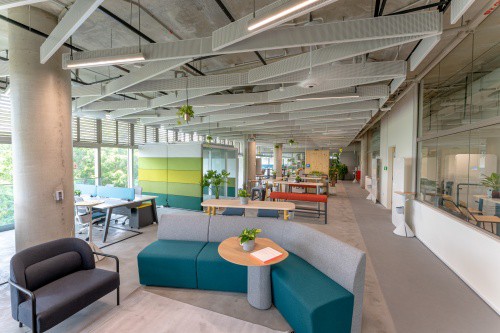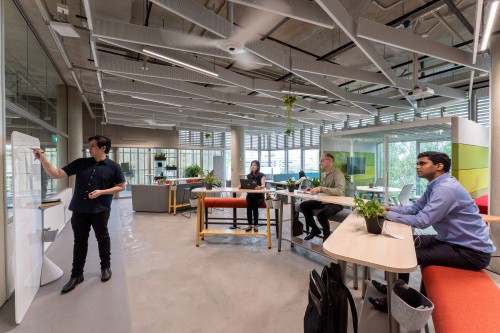Twelve years after they began the long-term partnership that has seen smart technologies being deployed at University Town (UTown), Johnson Controls and the National University of Singapore (NUS) last week finally opened its S$50 million Innovation Center, which will make the entire NUS campus a living laboratory for smart building technologies.
“The Johnson Controls OpenBlue Innovation Center embodies our approach towards building dynamic and resilient spaces, injecting new lease of life into the built environment sector,” said Visal Leng, president, building solutions, Asia Pacific, Johnson Controls, said. “Taking an unprecedented holistic and human-centric methodology, we are incorporating people and design perspectives, thus sparking greater innovation within industries and outside traditional boundaries.”
 OpenBlue is a suite of connected platform, solutions and services that combines the company’s 135 years of building expertise with cutting-edge digital technology. This open digital platform, when integrated with Johnson Controls core building systems and enhanced by ecosystem partners, connects traditionally separate systems to create new capabilities for safer, more agile, and sustainable space usages.
OpenBlue is a suite of connected platform, solutions and services that combines the company’s 135 years of building expertise with cutting-edge digital technology. This open digital platform, when integrated with Johnson Controls core building systems and enhanced by ecosystem partners, connects traditionally separate systems to create new capabilities for safer, more agile, and sustainable space usages.
For this OpenBlue Innovation Center initiative, the smart building specialist has teamed up with NUS and Microsoft as ecosystem partners. They aim to pioneer the use of a common configuration language that bridges core building technology with behavioural, wellness, and spatial data to develop solutions that meet new demands for safety and sustainability in connected spaces.
A net-zero energy building
The 240sqm centre is housed in SDE4, which is Singapore’s first new-build net-zero energy building. The indoor space is fitted with sensors — including overhead ventilation to measure air flow, and on furniture that provides insights on occupants’ alertness level.
The facility, located within the School of Design and Environment (SDE), at the NUS will be the home for a new breed of customisable, contact-free applications built on Johnson Controls’ unifying technology suite, OpenBlue.
Engineers from the centre and collaborating NUS researchers will collect and analyse data using OpenBlue, leveraging artificial intelligence (AI) and analytics to obtain a qualitative and quantitative understanding of the interactions between technology, indoor environments, and occupant well-being.
The ecosystem of partners will tap on the intelligence generated from the centre to create evidence-backed solutions for healthier, safer, and connected indoor spaces.
“SDE is thrilled to host the Johnson Controls’ OpenBlue Innovation Center in SDE4 and to facilitate cross-disciplinary research and development initiatives across the entire NUS community,” said Professor Lam Khee Poh, dean of NUS School of Design and Environment. “This partnership strengthens the School’s ‘Well & Green’ vision that emphasises a people-centric integrated design approach that generates sustainable and resilient value propositions in its endeavours.”
 By serving as a living laboratory for the OpenBlue Innovation Center’s pioneering solutions, NUS is advancing ongoing efforts to develop a smart, sustainable and safe campus for its staff and students.
By serving as a living laboratory for the OpenBlue Innovation Center’s pioneering solutions, NUS is advancing ongoing efforts to develop a smart, sustainable and safe campus for its staff and students.
This latest collaboration with Johnson Controls also includes joint research and innovation in the areas on built and urban environment, particularly in data analytics, sustainability and operations, as well as people and wellness. There will also be opportunities for collaboration on teaching and internship programmes.
The facility is expected to have more than 100 employees within four years, with strong focus on talent development with NUS at both undergraduate and post-graduate levels
Regional ambition for a future-ready built environment
Johnson Controls established the centre with the blessing from the Singapore Economic Development Board (EDB). The ultimate goal is to create smart building technologies for the future not only for Singapore but for adoption across Asia Pacific.
This S$50million initiative is a product of long partnership history between the company and university.
In 2008, Johnson Controls was the appointed partner to implement a converged campus building management solution for NUS UTown. The UTown achieved the Green Mark District Award, the first for NUS, in 2010.
Throughout the last 10 years, Johnson Controls had introduced different technologies to enable the precinct to achieve energy savings of 20%. The latest remote maintenance capability introduced at UTown has also proven to be practical and crucial during the current pandemic conditions.
“NUS and Johnson Controls have collaborated on several campus projects and we are therefore very excited to extend our partnership through these new initiatives which are part of our Smart, Safe and Sustainable Campus strategies,” said Professor Yong Kwet Yew, NUS senior vice president (Campus Infrastructure).
He added: “The opportunity to test Johnson Controls’ novel solutions on our campus and conduct joint research will help advance our ongoing efforts to build smarter, healthier and sustainable work, teaching and learning spaces for our staff, faculty and students.”


